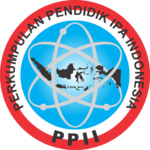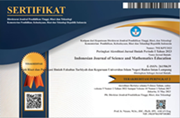The influence of artificial intelligence on critical thinking ability in mathematics: A systematic literature review
Abstract
Keywords
Full Text:
PDFReferences
T. Stefanova, S. Georgiev, Ц. Стефанова, and С. Георгиев, “Possibilities for using AI in mathematics education,” Mathematics and Education in Mathematics, vol. 53, pp. 117–125, Mar. 2024, doi: 10.55630/MEM.2024.53.117-125.
F. Niño-Rojas, D. Lancheros-Cuesta, M. T. P. Jiménez-Valderrama, G. Mestre, and S. Gómez, “Systematic Review: Trends in Intelligent Tutoring Systems in Mathematics Teaching and Learning,” International Journal of Education in Mathematics, Science and Technology, vol. 12, no. 1, pp. 203–229, Oct. 2024, doi: 10.46328/IJEMST.3189.
S. Orhani, “Artificial Intelligence in Teaching and Learning Mathematics,” Kosovo Educational Research Journal, vol. 2, no. 3, pp. 29–38, 2021, doi: https://doi.org/10.29228/kerjournal.54981.
M. Z. Bin Mohamed, R. Hidayat, N. N. B. Suhaizi, N. B. M. Sabri, M. K. H. Bin Mahmud, and S. N. B. Baharuddin, “Artificial intelligence in mathematics education: A systematic literature review,” International Electronic Journal of Mathematics Education, vol. 17, no. 3, p. em0694, Jun. 2022, doi: 10.29333/IEJME/12132.
C. L. Chen and C. C. Wu, Students’ behavioral intention to use and achievements in ICT-Integrated mathematics remedial instruction: Case study of a calculus course, vol. 145. Elsevier Ltd, 2020. doi: 10.1016/j.compedu.2019.103740.
O. Zawacki-Richter, V. I. Marín, M. Bond, and F. Gouverneur, “Systematic review of research on artificial intelligence applications in higher education – where are the educators?,” International Journal of Educational Technology in Higher Education 2019 16:1, vol. 16, no. 1, pp. 1–27, Oct. 2019, doi: 10.1186/S41239-019-0171-0.
J. M. Spector and S. Ma, “Inquiry and critical thinking skills for the next generation: from artificial intelligence back to human intelligence,” Smart Learning Environments 2019 6:1, vol. 6, no. 1, pp. 1–11, Sep. 2019, doi: 10.1186/S40561-019-0088-Z.
W. Mengist, T. Soromessa, and G. Legese, “Method for conducting systematic literature review and meta-analysis for environmental science research,” MethodsX, vol. 7, p. 100777, Jan. 2020, doi: 10.1016/j.mex.2019.100777.
S. Natale and A. Ballatore, “Imagining the thinking machine: Technological myths and the rise of artificial intelligence,” Convergence: The International Journal of Research into New Media Technologies, vol. 26, no. 1, pp. 3–18, Jun. 2017, doi: 10.1177/1354856517715164.
R. Luckin and M. Cukurova, “Designing educational technologies in the age of AI: A learning sciences-driven approach,” British Journal of Educational Technology, vol. 50, no. 6, pp. 2824–2838, Nov. 2019, doi: 10.1111/BJET.12861.
A. Y. Q. Huang, O. H. T. Lu, and S. J. H. Yang, “Effects of artificial Intelligence–Enabled personalized recommendations on learners’ learning engagement, motivation, and outcomes in a flipped classroom,” Comput Educ, vol. 194, p. 104684, Mar. 2023, doi: 10.1016/J.COMPEDU.2022.104684.
B. Cope, M. Kalantzis, and D. Searsmith, “Artificial intelligence for education: Knowledge and its assessment in AI-enabled learning ecologies,” Educational Philosophy and Theory, vol. 53, no. 12, pp. 1229–1245, Oct. 2021, doi: 10.1080/00131857.2020.1728732.
C. K. Y. Chan, “A comprehensive AI policy education framework for university teaching and learning,” International Journal of Educational Technology in Higher Education, vol. 20, no. 1, pp. 1–25, Dec. 2023, doi: 10.1186/S41239-023-00408-3/FIGURES/1.
J. Crawford, M. Cowling, and K. A. Allen, “Leadership is needed for ethical ChatGPT: Character, assessment, and learning using artificial intelligence (AI),” Journal of University Teaching & Learning Practice, vol. 20, no. 3, p. 02, Mar. 2023, doi: 10.53761/1.20.3.02.
C. Perrotta and N. Selwyn, “Deep learning goes to school: toward a relational understanding of AI in education,” Learn Media Technol, vol. 45, no. 3, pp. 251–269, Jul. 2020, doi: 10.1080/17439884.2020.1686017.
K. Seo, J. Tang, I. Roll, S. Fels, and D. Yoon, “The impact of artificial intelligence on learner–instructor interaction in online learning,” International Journal of Educational Technology in Higher Education, vol. 18, no. 1, pp. 1–23, Dec. 2021, doi: 10.1186/S41239-021-00292-9/TABLES/7.
N. Nazari, M. S. Shabbir, and R. Setiawan, “Application of Artificial Intelligence powered digital writing assistant in higher education: randomized controlled trial,” Heliyon, vol. 7, no. 5, May 2021, doi: 10.1016/j.heliyon.2021.e07014.
Aisyah, P. D. Yulianti, S. Yandhini, A. D. P. Sari, I. Herawani, and I. Oktarini, “The Influence Of AI on Students’ Mind Patterns,” BICC Proceedings, vol. 2, pp. 183–186, Jun. 2024, doi: 10.30983/BICC.V1I1.125.
C. Song and Y. Song, “Enhancing academic writing skills and motivation: assessing the efficacy of ChatGPT in AI-assisted language learning for EFL students,” Front Psychol, vol. 14, p. 1260843, Dec. 2023, doi: 10.3389/FPSYG.2023.1260843/BIBTEX.
M. L. How and W. L. D. Hung, “Educational Stakeholders’ Independent Evaluation of an Artificial Intelligence-Enabled Adaptive Learning System Using Bayesian Network Predictive Simulations,” Education Sciences 2019, Vol. 9, Page 110, vol. 9, no. 2, p. 110, May 2019, doi: 10.3390/EDUCSCI9020110.
X. Zhou, J. Zhang, and C. Chan, “Unveiling Students’ Experiences and Perceptions of Artificial Intelligence Usage in Higher Education,” Journal of University Teaching and Learning Practice, vol. 21, no. 06, Apr. 2024, doi: 10.53761/XZJPRB23.
R. Z. Alghamdy, “Pedagogical and Ethical Implications of Artificial Intelligence in EFL Context: A Review Study,” English Language Teaching, vol. 16, no. 10, p. p87, Sep. 2023, doi: 10.5539/ELT.V16N10P87.
X. Zou, P. Su, L. Li, and P. Fu, “AI-generated content tools and students’ critical thinking: Insights from a Chinese university,” IFLA Journal, vol. 50, no. 2, pp. 228–241, Jun. 2024, doi: 10.1177/03400352231214963/ASSET/IMAGES/LARGE/10.1177_03400352231214963-FIG7.JPEG.
J. Kim, H. Lee, and Y. H. Cho, “Learning design to support student-AI collaboration: perspectives of leading teachers for AI in education,” Educ Inf Technol (Dordr), vol. 27, no. 5, pp. 6069–6104, Jun. 2022, doi: 10.1007/S10639-021-10831-6/TABLES/1.
X. H. Jia and J. C. Tu, “Towards a New Conceptual Model of AI-Enhanced Learning for College Students: The Roles of Artificial Intelligence Capabilities, General Self-Efficacy, Learning Motivation, and Critical Thinking Awareness,” Systems 2024, Vol. 12, Page 74, vol. 12, no. 3, p. 74, Feb. 2024, doi: 10.3390/SYSTEMS12030074.
DOI: http://dx.doi.org/10.24042/ijsme.v8i1.24352
Refbacks
- There are currently no refbacks.
Copyright (c) 2025 Unit Riset dan Publikasi Ilmiah FTK UIN Raden Intan Lampung

This work is licensed under a Creative Commons Attribution-ShareAlike 4.0 International License.

Indonesian Journal of Science and Mathematics Education is licensed under a Creative Commons Attribution-ShareAlike 4.0 International License.





